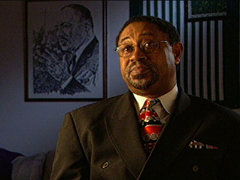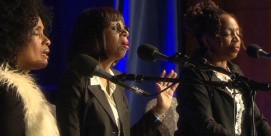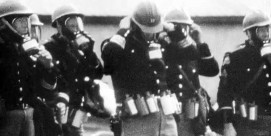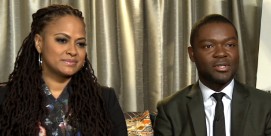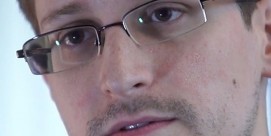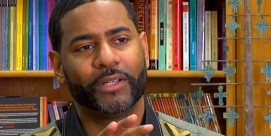In This Episode << SLIDE LEFT TO SEE ADDITIONAL SEGMENTS
Professor Lewis Baldwin
Read more of Kim Lawton’s interview about Martin Luther King Jr. with Professor Lewis Baldwin:
Many labels were attached to [Dr. King] during his lifetime. He was called a civil rights activist; he was called a social activist, a social change agent, a world figure. But I think he thought of himself first and foremost as a preacher, as a Christian pastor.
Dr. King grew up in a family of pastors. His father was a pastor. His grandfather had been a pastor. His great-grandfather had been a pastor, and several of his uncles were preachers and pastors. I think it was very much a part of his religious background. He was brought up in the Baptist church in the South, Southern black Baptist Protestantism, and of course he maintained his roots throughout his life. Coming out of that religious background — a family of preachers, of pastors, women known for their piety and devotion to the church — provided him with what he needed in terms of resources, tradition, insight, to become the kind of preacher and pastor he ultimately became.
In 1954, he was writing his dissertation at Boston University, and he received an appointment at Dexter Avenue Baptist Church in Montgomery, Alabama. So he went down in 1954 and assumed a pastor role there. He was at Dexter Avenue from 1954 to December 31, 1959. He was working at the congregational level, and I think he always valued the role of pastor at the congregational level because it put him in touch in a very personal way with people. He understood that if one wanted to be a social change agent in the black community, if one wanted to be involved in changing the system for the better, one had to maintain a pastoral role in the black church. And, of course, that’s why he maintained that pastoral role, even as he got involved in the broader arena of society through the civil rights movement. He understood the role of pastor at the congregational level. He always felt, however, that he didn’t have the time to serve that role sufficiently within a local congregational context.
He was always a great preacher. He always spoke of this interrelationship between the preaching role and the pastoral role and the priestly role and the prophetic role. He saw an essential interdependence, an interrelatedness between these four roles. He was always known for his oratorical skills, his skills of communication, so he excelled, I think, in the preaching area. He often did not have sufficient time to engage in counseling, to do funerals and weddings, to do the kind of administrative work that comes naturally with the pastoral role. He often did not have sufficient time to cover those areas, but in the preaching area he excelled. Also in the priestly area, I think. He always was available to affirm people, to reaffirm people within the context of the movement, people who had been hurt, people who had been brutalized, so I think he brought that priestly role in as well and also the prophetic role, because he took a critical approach to life. He spoke to the need to improve our culture, to improve our racial practices, to eliminate problems of racism, poverty, economic injustice, violence. All of that was a part of his pastoral role. In fact, he saw his civil rights activities as an extension of his pastoral role.
There’s a tendency in our culture for people to separate those roles. When people think of a pastor, they think of a person who simply has supervision over a local congregation. A civil rights activist or a social activist is something quite different, a person who is involved in the broader arena of society, trying to bring about social, economic, and political change. Dr. King did not make that distinction. Being a pastor, for him, was being a civil rights leader. Being a pastor was being a social activist or social change agent, and being a pastor for him also meant speaking out on issues that impacted the global community or the entire world. Issues of war and peace, economic injustice — this is how he viewed his role as pastor. It involved not only the preaching aspect but also the prophetic and priestly dimensions.
The pastor role was central to virtually everything that Dr. King achieved or sought to achieve in the church and in society as a whole. Not only was he a pastor at the local level, preaching to people, responding to the needs of people; he was also a pastor to the nation, because he was very interested in the soul of the nation, determined to redeem the soul of the nation. So in a very real sense he was not only a pastor at the congregational level but an American pastor who was deeply, deeply concerned about redeeming the soul of America. I don’t think Dr. King saw any tension between those two roles. He was often approached by people who saw a tension there, but for him the roles are clearly interdependent and interrelated. They inform each other.
Dr. King brought to his pastor role a lot of spiritual and intellectual resources and personal qualities, as well. He was able to connect to the spirituality of the people there in Montgomery, and I think that’s very, very important when you want to pastor people, when you want to lead people in a social movement. Dr. King brought personal qualities — charisma, oratorical skills. He was well trained, and he understood the spirituality of the people he was pastoring. Some of his earliest sermons, interestingly enough, dealt with the love ethic — agape love — as the center of the Christian faith. He talked a lot about fear in his sermons. He talked a lot about hope in his sermons, and he addressed some of the major contemporary issues of his time such as the communist threat, the nuclear threat, problems of economic injustice as they extended across the United States into other parts of the world. His prayers tell us a lot about his spirituality and also about the fact that he was located in a particular church tradition. He found prayer to be the very essence of religion. Prayer was a supporting mechanism for him in the context of struggle because he could always go into the church, into his private study, and offer prayer. Prayer was very, very important to his ability to deal with the threats on his life that came daily, to deal with the day-to-day struggle in the streets, to deal with arrests and other problems that surfaced in the context of his activities in the movement. I think prayer was a very personal thing for him; it was also a very communal thing for him. He believed a lot in the personal dimensions of prayer, and he also believed in the importance of communal prayer. And communal prayer for him was essential in the movement because it gave people the courage, it motivated and inspired them, and it gave them the sense that they had divine companionship.
The movement was based on this whole concept of God being on our side as an oppressed people. Dr. King articulated that in his speeches and sermons, and he acted on that through his activities in the movement. There was always a sense of a supernatural presence in the movement — that somehow or another, people who were involved in the movement were not marching along alone, were not acting alone. God was involved in this history. God was involved in this movement. Dr. King brought that sense of the struggle to the movement.
The pastor in the Southern black church was a symbol of hope, of possibility, of achievement. Dr. King’s education, his spiritual gifts, and his personal qualities exemplified that. Toward the end of his life he was still a pastor. While he was so visible in the civil rights movement, he was still a pastor at Ebenezer Baptist Church in Atlanta. Being a pastor was definitely part of his religious self-understanding. It was a sense of his fundamental calling, and he took that to Dexter Avenue. He was becoming increasingly involved in the struggle, but he needed to maintain that pastoral role. At Ebenezer, he often preached. He made it clear that he wanted to be able to preach at least one Sunday out of each month at Ebenezer. He couldn’t be there every Sunday because of the demands of the civil rights struggle, but he preached there. Many of the same roles that he had assumed in Montgomery he assumed also in Atlanta.
Dr. King taught us a lot about the revolutionary meaning of the gospel, the revolutionary significance of the gospel, the revolutionary potential of the gospel. We can learn a lot from him as preachers and pastors about how to apply the resources and insights of the Christian faith and tradition not only to the daily problems we confront but also to public policy concerns — issues like health care and violence, decent and affordable housing. Dr. King teaches us so much about how to apply the gospel of Jesus Christ to a range of problems that we confront in our society — violence, hatred, bigotry, intolerance.
I think Dr. King always felt that a preacher and a pastor had to be relevant. You must speak to the issues of your time, and you must be able to relate the gospel and biblical revelation to the social issues and concerns of your time. We live in a time when, instead of just celebrating the dream as we often do in January of each year, we need to start affirming and pursuing the dream. There are so many levels at which Dr. King’s ideals and insights can be applied today.

